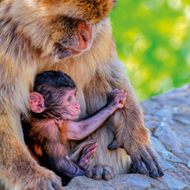Tourists fail to identify aggression in wild monkeys

The study found that tourists often fail to identify aggressive and distressed emotional states in wild monkeys
A study by the University of Lincoln has found that tourists often fail to identify aggressive and distressed emotional states in wild monkeys, misreading aggression as ‘smiles’ and ‘kisses’.
The study, published in the journal PeerJ, found that this misunderstanding could lead to welfare problems for primates and increase risk of injury to humans.
The paper suggests that videos or supervised visits led by experts would educate tourists about how best to read emotions in animals in wildlife parks, together with advice on maintaining safe distance from the animals.
"There is a growing interest in wildlife tourism, and in particular primate tourism. People travel to encounter wild animals, many of them attempting to closely interact with monkeys, even though this is often prohibited,” commented lead author Dr Laëtitia Maréchal.
“Our findings indicate that people who are inexperienced in macaque behaviour have difficulties in recognising monkey’s emotions, which can lead to dangerous situations where they think the monkeys are happy but instead they are threatening them.”
In the study, researchers assessed three groups of participants, with different levels of experience, on what emotions were being portrayed in pictures of macaques.
They found that all participants, regardless of their experience, made some mistakes. Many confused aggressive faces with non-threatening neutral or friendly faces.
The experts made just under seven per cent of mistakes, participants who were exposed to 2D images of monkey faces made just over 20 per cent of mistakes, and participants who had never or rarely encountered live monkeys made nearly 40 per cent of mistakes.
“When on site in Morocco, I often heard tourists in saying that the monkey seemed to blow them a kiss when they actually displayed a threatening face,” added Dr Maréchal.
“The tourists often responded by imitating the monkey’s facial expression, which generally ended by either aggression by the monkey towards the tourists or the monkey leaving the interaction.
“If we can educate people, and prevent monkey bites, we can not only reduce the risk of disease infection, we can improve the tourism experience. These findings are highly relevant to the general public and any professional in wildlife tourism, where wild animals can interact with the general public.”



 The BSAVA has opened submissions for the BSAVA Clinical Research Abstracts 2026.
The BSAVA has opened submissions for the BSAVA Clinical Research Abstracts 2026.